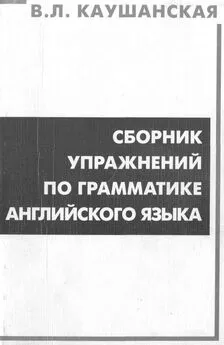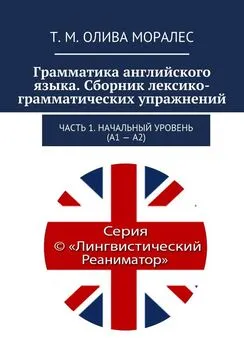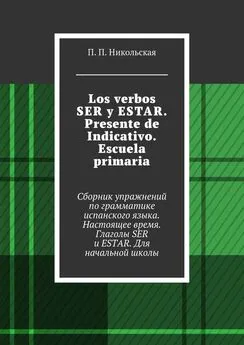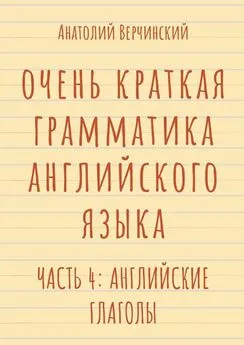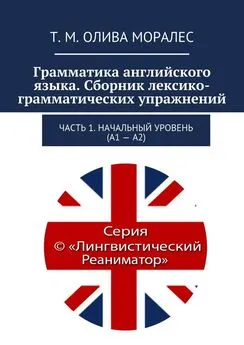В. Каушанская - Сборник упражнений по грамматике английского языка
- Название:Сборник упражнений по грамматике английского языка
- Автор:
- Жанр:
- Издательство:неизвестно
- Год:неизвестен
- ISBN:нет данных
- Рейтинг:
- Избранное:Добавить в избранное
-
Отзывы:
-
Ваша оценка:
В. Каушанская - Сборник упражнений по грамматике английского языка краткое содержание
Сборник упражнений по грамматике английского языка - читать онлайн бесплатно полную версию (весь текст целиком)
Интервал:
Закладка:
1. If Savina were with him at this moment, his doubts and loneliness would evaporate. (Wilson) 2. She felt if she could lose herself in her mother's arms she would be able to endure the pain that was so intense. (Caldwell) 3. Herzog pictured what might have happened if instead of listening so intensely and thoughtfully he had hit Madeleine in the face. (Bellow) 4. When she's alone and humiliated and broken it would be dreadful if she had nowhere to go. (Maugham) 5. I think, if he wouldn't mind, 1 should rather Hke him to spare me five minutes. (Snow) 6. If the tradition be ever broken it will be for an abler man than Stephen. (Shaw) 7. Jeff wished to suggest that it might be best if he went back to Lord's Creek. (Caldwell) 8. It would be worse than before if I should lose you now. (Greene) 9. I left a message for him... that I should be glad to see him for a moment on a matter of importance for himself, and that if he would look in here when he was passing he would be welcome. (Shaw) 10. He wondered what Bob Watson would say and do if he should happen to see one of his tenants' crops in that condition. (Caldwell) 11. My shirt and trousers, stained with heat, dew, grass, and the Kentish soil on which I had slept — and torn besides—might have frightened the birds from my aunt's garden, as I stood at the gate. (Dickens) 12. She thrilled from head to toe at the question. A piece of ice dropped down her back could not have startled her more. (Dreiser) 13. I should tell your son to keep away from him if I were you. (A. Wilson) 14. If I had gone overseas, instead of him, I might have learned something and been somebody. (Baum) 15. If she could have been compressed to about three quarters of her actual width, she would have been very attractive. (Amis)
1. She wanted him to be a member of Parliament only that he __ a claim on the gratitude of his party, (to have) (Maugham) 2. God __ me from such friends in future, (to save) (Lindsay) 3. Andrews turned up the collar of his coat, lest he __ (to recognize— passive) (Greene) 4. I am prepared to gratify all your whims, however unreasonable they __ (to be) (Maugham) 5. Do you think she __ and have lunch with me if I „her? (to come, to telephone) (Hansford Johnson) 6. "Oh God __ you! How could you strike an otd woman like that?" (to forgive) (Shaw) 7. Tell them I leave my country that I __ free, and it is the end and the beginning, (to be) (Buck) 8. "Mr. Penty," said the doctor.... "in my experience, very few people are perfectly well, although they __ they are." (to imagine) (Priestley) 9. I keep a diary in order to enter the wonderful secrets of my life. If I __ them down, I __ probably __ all about them, (to write — negative, to forget) (Wilde) 10. He seemed to be dozing when she returned, and she put the low fire together very softly lest she __ him. (to awake) (Dickens) 11. Whatever your father __ once __, to day he's decay; he's age; he's everything that's corrupt and evil, (to be) (Gow and D’Usseau) 12. God __ for her kind heart, (to thank — passive) (Lindsay) 13. If necessary, 1 could cable her to tell her his address in order that she __ Australia without seeing him. (to leave — negative) (Shute) 14. I __ you if I __ a way out, but there isn't one. (to press — negative, to see) (Maugham) 15. It was plain that however conscientious Cassilis __, however desperately hard and intelligently he __, he would never get his captaincy, (to be, to work) (Hansford Johnson) 16. And, fearful lest he __ Soames turned away and mounted slowly to his room, (to see — passive) (Galsworthy) 17. This was true, and he __ to meditate on this sad confession if he __ otherwise engaged, (to pause, to be — negative) (Murdoch) 18. He had to admit to himself that whatever Miss Dobb's faults __, she was the right sort of girl to take to a restaurant, (to be) (Lessing)
1. В этом зале очень хорошая акустика (acoustics); где бы вы ни сидели, вы все услышите. 2. У нас были очень плохие места; если бы акустика в этом зале не была такой хорошей, мы бы ничего не услышали. 3. Как бы он ни был занят,. он находил время ходить в театр. 4. Как он ни занят, он находит время ходить в театр. 5. Что бы вы ни говорили, мне эта пьеса не нравится. 6. Врач сказал: «Как ни слаб больной, его надо оперировать». 7. Если бы не операция, больной, возможно, умер бы. 8. Сестра закрыла окно, чтобы шум не разбудил больного. 9. Врач сказал: «Больной теперь вне опасности. Но если бы случилось так, что у него опять поднялась температура, позвоните мне немедленно». 10. Когда бы вы ни пришли ко мне, я всегда буду рад вас видеть. 11. Приходите пораньше, чтобы я мог показать вам свои книги. 12. Машина остановилась, чтобы туристы посмотрели развалины старого монастыря. 13. Как бы темна ни была ночь, нам придется продолжать путь. 14. Как ни темна была ночь, туристы решили продолжать путь. 15. Если бы не звезды, которые так ярко светили, не было бы видно ни зги (to be pitch dark). 16. Я принес вам журнал, чтобы вы прочитали эту статью. 17. Позвоните мне вечером, как бы поздно вы ни вернулись домой. 18. Нан деньте пальто, чтобы не простудиться. 19. Как бы он ни был взволнован час тому назад, сейчас он кажется совершенно спокойным. 20. Мне пришлось взять такси, чтобы не опоздать на поезд.
1. She took up her work and began to sew, as if it __ always __ her custom to work in this room, (to be) (Greene) 2. It's important that he __ what he wants, (to have) (A. Wilson) 3. Have you realized that though you __ towns and win battles, you cannot conquer a nation, (to occupy) (Shaw) 4. It was not Sir Edgar's intention that such a remarkable performance __ (to curtail — passive) (A. Wilson) 5. You __ to carry so much weight if you __ the proper exercise, (to have — negative, to take) (Caldwell) 6. Mrs. Strickland was taking her family to the coast of Norfolk, so that the children __ the sea and her husband golf, (to have) (Maugham) 7. You look as if you __ toothache... (to have)' (Wilde) 8. Then he looked at his hands; he looked at them as if he __ just __ he had them and __ yet __ what they were for. (to discover, to puzzle out — negative) (Faulkner) 9. The poor little woman will stand up for her brother, whatever he __ (to be) (James) 10. I thought it was necessary that we __ a short conversation before I left this house. (to have) (Maugham) 11. You are as right as can be and far __ it from me to tell you otherwise, (to be) (Dickens) 12. He sounded as though he __ us to see, __ himself to see, that he was happy. (to want — negative, to want — negative) (Snow) 13. I dared not express my anxiety, lest it __ her offence, (to give) (Dickens) 14. Without his help she __ never __ able to achieve an independent establishment and a clientele, (to be) (Murdoch) 15. After a while she saw Tommy. She went straight towards him, as if she __ for him all the while, (to look) (Faulkner) 16. We must remember that though she __ grievously in leaving her home, she is still our sister, (to err) (Hardy) 17. If only he __ freel (to be) (Galsworthy) 18. Letters came to her from the family worded with a sort of anxious astonishment that Soames __ such a thing happen to him. (to have) (Galsworthy) 19. She had brought the nurse back to attend to Laura, so that all her time __ for her husband and his mother, (to be) (Hansford Johnson)
Based on an episode from Vanity Fair by W. Thackeray.
1. Мать Бекки была француженка, и девушка говорила по-французски так, словно она всю жизнь прожила в Париже. 2. Когда Бекки было шестнадцать лет, друзья ее отца обращались с ней, как со взрослой женщиной (как если бы она была взрослой женщиной), и часто отказывались (to give up) от самых веселых балов и пирушек (parties), чтобы провести с ней ветер. 3. После смерти отца Бекки переехала в Чизик (Chiswick), в пансион мисс Пинкертон, которая взяла девушку для того, чтобы она говорила по-французски с ее ученицами. 4. Когда мисс Пинкертон услышала, как Бекки играет на рояле, она подумала, что было бы желательно, чтобы девушка учила ее воспитанниц также и музыке. 5. Мисс Пинкертон никогда не была добра к Бекки и всячески (in every way possible) старалась оскорбить и унизить ее. Она бы иначе относилась к девушке, если бы та была дочерью богатых родителей. 6. «Что бы Эмилия ни говорила,—думала Бекки, —я знаю, что мисс Пинкертон ненавидит меня. Она никогда не взяла бы меня, если бы моя работа не была для нее выгодна». 7. Бекки тоже ненавидела мисс Пинкертон и относилась к ней, как к своему злейшему врагу (worst enemy). 8. Бекки уехала бы из Чизика, но она прекрасно понимала, что для нее очень важно получить хорошее образование. «Какой бы несчастной я себя ни чувствовала у мисс Пинкертон, мне придется некоторое время здесь оставаться»,—думала Бекки. 9. Как ни выгодна была для мисс Пинкертон работа Бекки, она решила, наконец, что будет лучше, если девушка уедет из Чизика. Она понимала, что для того, чтобы Бекки не оказала плохого влияния на ее учениц, им лучше расстаться. 10. Когда Бекки выразила желание, чтобы мисс Пинкертон нашла ей место гувернантки, та немедленно нашла такое место н таким образом избавилась от девушки.
Читать дальшеИнтервал:
Закладка:
